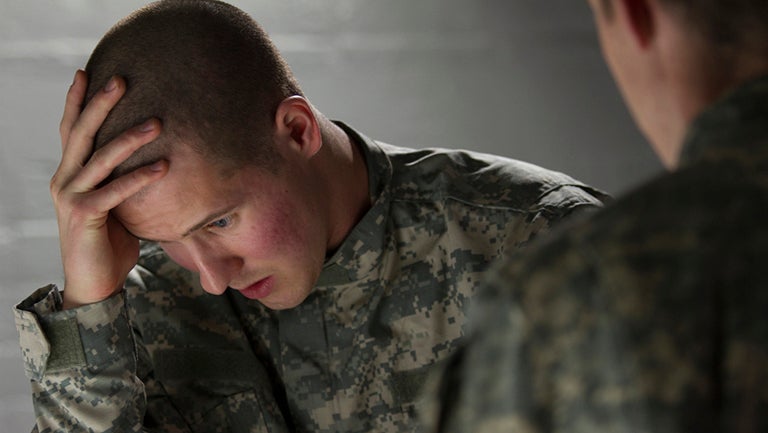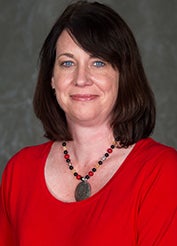Title: Psychology Professor to Evaluate Veterans’ Mental Health Program
Georgetown psychology professor Jennifer Woolard will evaluate a new program aimed at reducing the rates of suicide and Post-Traumatic Stress Disorder in veterans.

A new program aimed at reducing the rates of suicide and Post-Traumatic Stress Disorder in veterans will be evaluated in real-time by a Georgetown College psychology professor.
Associate professor Jennifer Woolard will evaluate Project Cohort, a new flagship initiative of Project Rebirth that will offer veterans with mental health challenges the chance to go on a multiday wilderness expedition, peer support and mental health sessions.
The three-year pilot program, a partnership of Project Rebirth, Georgetown, Outward Bound for Veterans and Sierra Club Military Outdoors, is likely to begin in the spring or early summer of 2015.
A Model Framework

“This is an important program because research shows that many, many veterans are experiencing significant mental health challenges and many of them also drop out or fail to access treatment,” says Woolard, whose late father-in-law, a World War II veteran, struggled with mental health issues. “We’re going to be able to evaluate Project Cohort from the beginning so we can tweak and refine it and then ultimately create a framework that other communities and organizations could adopt.”
Three to five Georgetown undergraduates as well as a graduate student will help Woolard evaluate the initiative.
Project Rebirth, a nonprofit organizationoriginally created by Georgetown alumnus Jim Whittaker (C’90) to support victims of and first responders to 9/11, has since expanded to include veterans.
Woolard has been working with Project Rebirth since 2007, when she and other faculty members were invited to a screening of Project Rebirth’s seminal film that follows for eight years the loss of nine people whose loved ones died in 9/11.
Incidence of PTSD
According to Project Cohort, between 11 and 20 percent of veterans of Operation Iraqi Freedom and Enduring Freedom have PTSD. About 10 percent of Desert Storm veterans have the condition as well as up to 30 percent of Vietnam War veterans.
Many of those veterans don’t seek treatment because they are concerned about looking weak, don’t believe the treatment would help them, think others would lose confidence in them and other issues, the organization states.
The pilot program participants will fill out standard questionnaires as well as some designed by David Scheinfeld, Project Rebirth’s director of research, who is now also affiliated with Woolard’s Georgetown Community Research Group.
Sitting Around the Campfire
The questionnaires will be filled out on iPads even while they are on their wilderness trips.
“They can literally take out their iPads while they’re sitting around the campfire,” notes Woolard, who has been involved with Project Rebirth for more than seven years. “The iPads will have the software on them so that the veterans can upload the data when the trip is over.”
Woolard says the veterans will be divided up into five groups, including a control group that will not receive the interventions but will be referred for other kinds of help.
The goal of the project is to provide a continuum of care model that integrates existing peer support, experiential learning and evidence-based therapies.
Community, Alumni Support
“This project connects and leverages existing resources and organizations and agencies,” says Woolard, who holds a Ph.D. in community and developmental psychology. “All of my training has been focused on understanding how communities can support the wellbeing of individuals in their communities.”
Whittaker is only one of a number of alumni involved in Project Rebirth and Cohort.
Former Army Chief of Staff Gen. George Casey (F’70) served as keynote speaker at the project’s launch event in late November in New York, and Brian Rafferty (C’79), chair of the Project Rebirth board of directors, made a gift to Georgetown to supply the veterans with iPads and other equipment.
Georgetown President John J. DeGioia is a member of the board.
Jimmy Sutton (C’15), a political economy major who maintained helicopters and installed communications technology for seven years for the U.S. Army in Iraq and Afghanistan, accompanied David Shearman (F’11, G’14), Georgetown’s Veterans Office coordinator, and Woolard to the launch event.
Meaningful Impact
Shearman served for six-and-a-half years on active duty in the Army Infantry with two deployments to Iraq.
“Project Cohort is a great example of how Georgetown’s role as a Jesuit University has a meaningful impact on the lives of veterans,” Sherman says. “The process of recovery after battle is key to the Georgetown identity since Jesuit founder St. Ignatius was himself a wounded warrior, inspired through his own scholarship and reflection during recovery to seek his role in the world.
“Partnering with Project Cohort means Georgetown gets to add its scholarship to the process of recovery for our latest generation of warriors who are transitioning into new roles in our society,” Shearman adds.